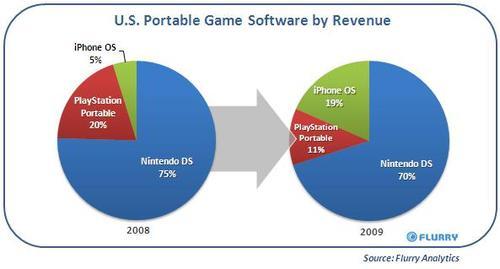More than 30,000 games have been released in the iPhone App Store since its launch in July 2008. With titles that consistently dominate the Top Paid and Top Grossing lists, there is no question that the games category is the most lucrative category in the App Store. This report focuses on how Apple has affected the market share of U.S. video game and portable game revenue since the introduction of games sold through the App Store for iPhone and iPod touch.
Using publicly available market data, provided by NPD (mostly through Gamasutra’s Behind the Numbers series), Flurry calculated U.S. console and portable game software sales for 2008 and 2009. We also estimated Nintendo DS and Sony PlayStation Portable game software sales, which make up the significant majority of the portable category, in order to compare these to iPhone game sales. We estimate iPhone game sales using a combination of data made available by Apple and using ratios and calculations from an aggregated set of data that we track through our analytics service.
We begin with a look at the U.S. gaming market, which NPD defines primarily as console and handheld. PC gaming, which has been declining over the last decade, and is currently approximately 5% of the total U.S. market, is not included. Also, for this analysis, we ignore online gaming revenue (e.g., virtual goods and subscription fees from social networking games and massively multi-player online games).
Below is our estimation of market share by platform among console, portable and iPhone platforms for 2008 and 2009.
NPD Group shows that combined U.S. console and portable software revenue was approximately $11 billion and $9.9 billion in 2008 and 2009, respectively. After estimating portable sales, we were able to back into console revenues. We then added our own estimates for iPhone game revenue, which total $115 million and $500 million for 2008 and 2009, respectively.
With these figures, our main finding is that iPhone (and iPod touch) is a gaming platform to be reckoned with. Controlling 5% revenue of a $10 billion industry in just a year and a half is significant. From a market share perspective, console games lost ground to portable platforms and iPhone. While the downturn in the economy may have dampened sales of the more expensive console games category, there is no denying that iPhone has generated substantial revenue and entered strongly into a mature industry.
More interesting to us than iPhone’s impact on U.S. gaming was its impact on the portable category, which we estimate totaled $2.25 billion and $2.55 billion in 2008 and 2009, respectively. Michael Pachter, managing director at Wedbush Morgan Securities and a prominent video game analyst, suggests “iPod touch is the most dangerous thing that ever happened” to game publishers. As prices come down for the iPod Touch, and games sold through the App Store continue to have lower price points, more of the young gaming generation may switch to Apple devices over Sony PSP and Nintendo DS for gaming. Further, Apple has squarely positioned the iPod Touch as a gaming machine. Check out a TV spot here to get an idea.
From what we calculate, consumers are downloading iPhone games in droves. Comparing iPhone against Sony and Nintendo games sales shows that Apple has taken nearly one fifth of the portable market in 2009, largely at the expense of Sony PSP. With Sony PSP Go, Sony’s latest effort to revive its portable sales, having fallen short of expectations, Sony finds itself now challenged by two competitors in this segment.

Looking forward, with the iPad set for an April release, the traditional gaming giants may yet again be disrupted by Apple. With companies like Electronic Arts and Gameloft joining Apple on stage during its January unveiling of the iPad, the tablet device will enjoy elite game publisher support on day one. Further considering data that Flurry released in its latest Smartphone Industry Pulse report, where we determined that more than one third of iPhone game developers come from the traditional gaming industry, Apple has already established broad third-party game publisher support. With the iPad featuring a larger screen and more processing power, games on the tablet take a step closer to PC and console gaming. Unless the other major video game platform providers (i.e., Sony, Nintendo and Microsoft) respond accordingly, Apple could continue to roll up video game market share.